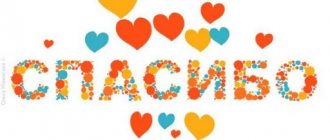Expressing sincere gratitude in words is not always easy. It’s not for nothing that successful people prepare words of gratitude in advance for important moments in their lives. Familiarization with the basic rules in advance will allow you to learn how to say thank you in beautiful words to your family, colleagues, teachers or boss.
- What's your last name? - OK, thank you! And yours? author unknown
Basic rules for expressing gratitude with words for congratulations
Words of gratitude differ depending on who they are intended for.
Relationships with loved ones (loved ones, parents, friends) require sincere and warm words of gratitude. Difficulties most often arise when you need to express gratitude for congratulations to work colleagues, boss or teachers. As a rule, at work the whole team congratulates their colleague on a significant event, so words of gratitude should be brief, but meaningful and sincere. Working in a team sometimes forces people with completely different character and temperament to communicate. A special relationship is established with each colleague: friendly or almost friendly with some, neutral with others, and hostile with others. You can, of course, say thank you to your teachers, boss or colleagues using general phrases, but it’s better to prepare something more suitable for a specific situation.
You can learn how to say “thank you” in beautiful words for congratulations on your birthday or any other holiday by familiarizing yourself with the simple rules:
- prepare words of gratitude in advance;
- speak sincerely;
- pay attention to gestures and facial expressions;
- include in the words of gratitude the name of the person to whom it is addressed;
- speak clearly;
- smile;
- do not be intrusive.
Gratitude is a moment of reciprocity. Every person is pleased to be appreciated, singled out, and congratulated. With the help of words of gratitude you can express how pleasant this attitude is. You can rehearse the day before and come up with basic phrases and work on gestures and facial expressions.
The Wonder Years
School is the best time in every person’s life. It’s a pity that we understand this many years later. Graduates and their parents must express words of gratitude to the teacher. After all, he invested knowledge, soul and strength into them. This profession is usually chosen by kind and creative individuals. Coping with several dozen children is very difficult. You need to find an approach to everyone, look into their soul and inspire trust. Material gifts, of course, also do not hurt teachers, but the most important thing is words of gratitude.
Words of gratitude
When pronouncing words of gratitude, you need to try to highlight a few points that you especially liked about the congratulation. For example, you can say this: “Sincere thanks to everyone for your congratulations and kind words. Indeed, health (family, success) is the most important thing in our lives.” You can thank someone beautifully by looking into a person’s eyes, it’s easier to express feelings. If there are several congratulators, you can look a little higher than the faces of the audience, so those congratulating will have the feeling that the hero of the event is looking at everyone.
Words of gratitude for a gift are not much different from gratitude for congratulations. If possible, you should unpack and look at the gift right away, so the gratitude will look more appropriate and genuine. Saying thank you for a song given, for example, on a wedding day or birthday needs to be emotional and from the heart, because the givers wanted to awaken pleasant emotions and memories, and this is the most precious gift.
Particle
In context, the word “thank you” can act as a particle characteristic of colloquial speech. It expresses the speaker’s attitude and adds an additional shade of meaning. The particle “thank you” is used to mean “good”, “yes”, “successful” .
- Example: “I couldn’t make jam without sugar, but thanks to my neighbor, I shared.” “I couldn’t have made the jam without sugar, but my neighbor shared it well.”
A particle is an unchangeable function word that does not belong to the members of a sentence. The isolation of the particle “thank you” depends on the intonation of the statement .
- Example: “It rained all day, thank you, at least the sun came out in the evening.” The intonation emphasizes “towards the evening”. A comma before “thank you” separates parts of a complex sentence.
- Example: “It rained all day, thank you at least, in the evening the sun came out.” The emphasis is on the word “even”, so a comma is placed after it.
- Example: “It rained all day, thanks at least the sun came out in the evening.” It is pronounced without a pause, so there is no comma after the word “thank you.”
How to express gratitude for a service
When a person helps his neighbor, it is a sign of kindness and self-sacrifice.
In this case, it is necessary to express gratitude, because the person spent his time and paid attention. As a rule, in this case they resort to material gratitude (flowers, sweets, etc.), which is not prohibited in some cases. However, a dry presentation is unlikely to leave a good impression on a person. Words of gratitude in this case should be concise, expressing how valuable the assistance or service provided was. It is not advisable to limit yourself to a banal “thank you”; it is better to make some accents, for example, say this: “Sincere thanks for your help with the report. Without your advice it would have been very difficult.” When saying gratitude, it is better to look directly at the person without hiding your gaze. If it is appropriate in a particular case, you can touch your arm or shoulder - the touch will help add sincerity to the words of gratitude.
Experiments by psychologists
From a psychological point of view, “no way” symbolizes a sign of lost benefit (benefit). It's better to choose something more acceptable. A very sophisticated answer is advised by the famous psychologist Robert Cialdini: “I’m sure you would do the same for me.” In this simple way, reciprocity begins. There is a feeling that good will be repaid with good (in the future tense).
Adam Grant considered it wrong to hint to a person about a future “return of the good deed.” And he slightly altered Cialdini’s phrase: “... I was glad to help, you would probably have done the same for me.” This removes the “aftertaste” from the first option, and the person does not feel like a debtor.
Gratitude to your beloved girl or man
Communication with loved ones is more relaxed, open and warm than, say, with colleagues or friends.
For a woman, expressing gratitude to her beloved man will not be difficult, because most of the fair sex are distinguished by their emotionality and the ability to openly express their feelings.
Men like to surprise their other halves and give them positive emotions. When presenting a gift or congratulations to his beloved girlfriend, a man unconsciously hopes for an energy recharge from the positive mood of his chosen one.
But for most men, a verbose and open expression of gratitude is difficult due to a more restrained temperament. An overly dry “thank you” can offend your other half.
When expressing gratitude to your beloved woman, you need to try to choose the words so that the woman has no doubt whether she liked her gift or congratulations. Be sure to reinforce your words of gratitude with a touch, hug or kiss.
What pictures and postcards can you use?
You can say “thank you” without saying it literally, effectively and completely free – in pictures.
Hand-drawn pictures are popular
Beautiful pictures are freely available and finding a suitable one with the word “thank you” will not be difficult.
Or this option
Russian- and English-language sites and photo stocks offer both .gif and static images.
Gif image
And on social networks there are special extensions, specialized groups and public pages with thematic images.
This little eye will not leave anyone indifferent
How to prepare words of gratitude in advance
A pre-prepared thank you speech may be needed when expressing gratitude to parents at a wedding, teachers at graduation, etc. In such cases, both prose and poetry are suitable. Nowadays, you don’t have to be a poet to thank your parents or teachers with a poem - you can find a suitable work on the Internet or order an individual thank-you poem from professionals. The main requirement for such a poem is quality and originality. Banal words will sound dull and inappropriate at a celebration.
Both newlyweds should thank their parents at the wedding, despite the fact that one may be more eloquent. This is an excellent opportunity to show the unity of a young family, so it is advisable to divide the speech between both newlyweds.
What is not allowed
Under no circumstances should you answer something like: “it’s not expensive”, “we didn’t buy it, I had a gift lying around at home”, “I got it as a present”, “bought it on sale”.
Some gestures are also unacceptable: waving, grinning, mysterious glances. The person who accepts the gift must see the clarity of the situation: you presented the gift with all your heart, and he joyfully accepts it. And no ambiguous hints!
All these words, gestures, facial expressions can not only offend a person, this is a serious request to never be invited into the house again. Therefore, think carefully about how to respond to “thank you.”
How to beautifully say THANK YOU for a compliment: example
- What a delicious pilaf! - Oh, it’s delicious, I’m always in a hurry, the cauldron has disappeared somewhere, the other dish is no longer the same, the rice came out a little dry and the color is paler than usual...
Do you really think that this is what the other person wanted to hear from you? With such an answer, you either emphasize that he understands the issue much less than you, or let him understand that it is better to refrain from compliments addressed to you (to be safe) - or even not to visit you at all. At the very least, mutual awkwardness in the conversation is guaranteed. But the person simply praised your dish.
Why is this happening?
Reason 1: Excessive modesty
Strict upbringing or low self-esteem often forces a person to respond to any compliment with denial - “You look great!” - “Well, stop it...” Reconsider your attitude towards yourself.
Reason 2: Compliment = lie
The common phrase “This is not a compliment, this is the truth” makes all pleasant remarks considered flattery and lies. Completely unfounded. Even if the interlocutor is a little disingenuous, this is not a reason to refuse to state the fact as a plus for yourself. You really are a great cook, don’t lie to yourself!
Reason 3: Fear of attention
A compliment pronounced in public will really turn the spotlight on you for a couple of seconds. Great, and in what form is it more comfortable to be under them? An awkward pathetic little lump - or with a dignified smile on his face? That's it.
Reason 4: Underwater part
Some people believe that a compliment obliges them to return the courtesy. But there is no need to dramatize the fable “The Cuckoo and the Rooster”: if they praised you, just thank them. When you have a reason and desire to praise others, then you will do it.
The other extreme
It is even more unwise to respond to a compliment by desperately engaging in self-praise - or launching into lengthy monologues about the subject of approval.
If a friend points out an interesting handbag, there is absolutely no need to tell you like a machine gun about what it is made of, what company it was made of, where you bought it and how difficult it must be to find the same one. Did you set yourself the goal of discouraging this friend from talking to you? No - that means abolish encyclopedic reviews in response to compliments.
The exception will be the case when your interlocutor becomes seriously interested in the subject himself - then you will be able to answer questions about where such a beautiful thing was bought or which hairdresser makes such interesting haircuts.
How to be?
Golden word.
Why not just say thank you? Sincerely say “Thank you!” - and this will be enough, if, of course, everything is in order with your intonation and facial expression. This answer option is most appropriate if your personal traits are being praised. We respond with attention. There is no need to hastily fabricate a return compliment. Just note that your interlocutor’s opinion matters to you: “I’m glad you liked it!”, “Thank you, I tried really hard.” Perfect for when they praise your gift, dish, or work done.
A little information:
Sometimes you can add a couple of words to your gratitude: “Thank you, this is my mother’s recipe,” “Thank you, the dish is famous, I just added other seasonings.”
And once again the casket opened simply. Adopt discreet gratitude and a sincere smile - and compliments around you will come more often, and also bring joy.
Reply to “thank you” by concept
There is an opinion that the options “thank you” and “good luck” are not used in “not so remote” places. The first one is sometimes even severely punished. That is why prisoners use the following variants: “from the heart”, “emotionally”, “thank you”, “thank you” , etc. What should be the response to “thank you” according to the concepts?
- As mentioned above, in the zone the answer is most often “material”: tea, cigarettes and other valuables that are very difficult to get.
- In some cases, the “quid pro quo” rule works.
- You remain indebted to your “benefactor.”
- And next time you have a “bleed from the nose” you will need to help this person out of a difficult situation.
Some people use options such as “our people - we’ll be counted”, “you can’t put a thank you in your pocket”, “three packs of tea and we’re even”, etc.
Below are even more different options for different situations. Read on.











